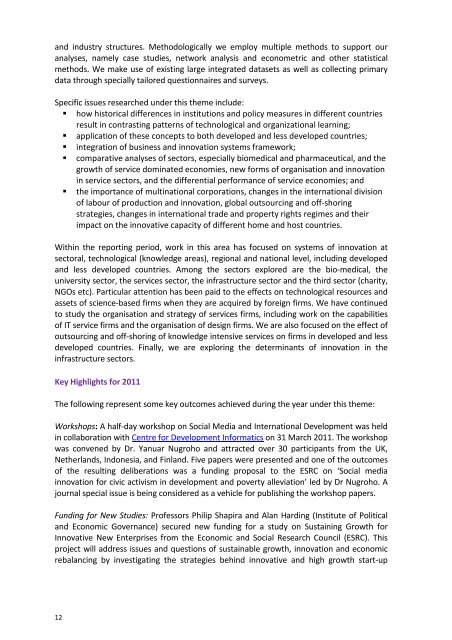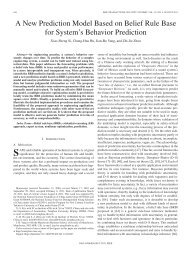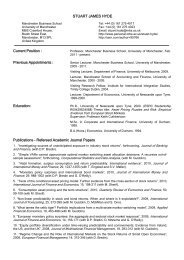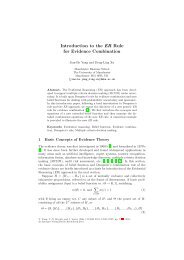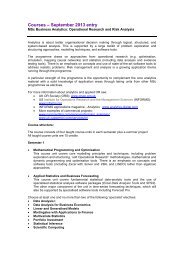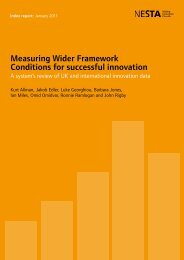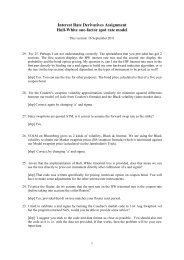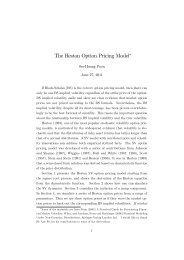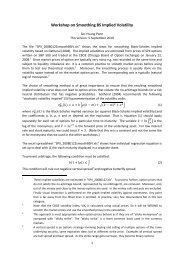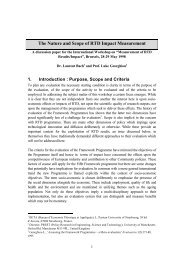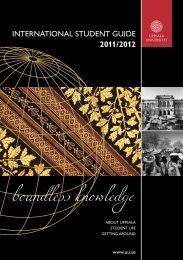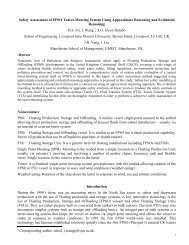Manchester Institute of Innovation Research ANNUAL REPORT ï²ï°ï±ï±
Manchester Institute of Innovation Research ANNUAL REPORT ï²ï°ï±ï±
Manchester Institute of Innovation Research ANNUAL REPORT ï²ï°ï±ï±
You also want an ePaper? Increase the reach of your titles
YUMPU automatically turns print PDFs into web optimized ePapers that Google loves.
and industry structures. Methodologically we employ multiple methods to support our<br />
analyses, namely case studies, network analysis and econometric and other statistical<br />
methods. We make use <strong>of</strong> existing large integrated datasets as well as collecting primary<br />
data through specially tailored questionnaires and surveys.<br />
Specific issues researched under this theme include:<br />
how historical differences in institutions and policy measures in different countries<br />
result in contrasting patterns <strong>of</strong> technological and organizational learning;<br />
application <strong>of</strong> these concepts to both developed and less developed countries;<br />
integration <strong>of</strong> business and innovation systems framework;<br />
comparative analyses <strong>of</strong> sectors, especially biomedical and pharmaceutical, and the<br />
growth <strong>of</strong> service dominated economies, new forms <strong>of</strong> organisation and innovation<br />
in service sectors, and the differential performance <strong>of</strong> service economies; and<br />
the importance <strong>of</strong> multinational corporations, changes in the international division<br />
<strong>of</strong> labour <strong>of</strong> production and innovation, global outsourcing and <strong>of</strong>f-shoring<br />
strategies, changes in international trade and property rights regimes and their<br />
impact on the innovative capacity <strong>of</strong> different home and host countries.<br />
Within the reporting period, work in this area has focused on systems <strong>of</strong> innovation at<br />
sectoral, technological (knowledge areas), regional and national level, including developed<br />
and less developed countries. Among the sectors explored are the bio-medical, the<br />
university sector, the services sector, the infrastructure sector and the third sector (charity,<br />
NGOs etc). Particular attention has been paid to the effects on technological resources and<br />
assets <strong>of</strong> science-based firms when they are acquired by foreign firms. We have continued<br />
to study the organisation and strategy <strong>of</strong> services firms, including work on the capabilities<br />
<strong>of</strong> IT service firms and the organisation <strong>of</strong> design firms. We are also focused on the effect <strong>of</strong><br />
outsourcing and <strong>of</strong>f-shoring <strong>of</strong> knowledge intensive services on firms in developed and less<br />
developed countries. Finally, we are exploring the determinants <strong>of</strong> innovation in the<br />
infrastructure sectors.<br />
Key Highlights for 2011<br />
The following represent some key outcomes achieved during the year under this theme:<br />
Workshops: A half-day workshop on Social Media and International Development was held<br />
in collaboration with Centre for Development Informatics on 31 March 2011. The workshop<br />
was convened by Dr. Yanuar Nugroho and attracted over 30 participants from the UK,<br />
Netherlands, Indonesia, and Finland. Five papers were presented and one <strong>of</strong> the outcomes<br />
<strong>of</strong> the resulting deliberations was a funding proposal to the ESRC on ‘Social media<br />
innovation for civic activism in development and poverty alleviation’ led by Dr Nugroho. A<br />
journal special issue is being considered as a vehicle for publishing the workshop papers.<br />
Funding for New Studies: Pr<strong>of</strong>essors Philip Shapira and Alan Harding (<strong>Institute</strong> <strong>of</strong> Political<br />
and Economic Governance) secured new funding for a study on Sustaining Growth for<br />
Innovative New Enterprises from the Economic and Social <strong>Research</strong> Council (ESRC). This<br />
project will address issues and questions <strong>of</strong> sustainable growth, innovation and economic<br />
rebalancing by investigating the strategies behind innovative and high growth start-up<br />
12


